#seventeenth installment
Explore tagged Tumblr posts
Text
Five years of war relief
A speech of welcome to Mr. Wendell L. Willkie upon his visit to Chungking, delivered at a tea party given on October 4, 1942, by Madame Chiang Kai-shek, as honorary chairman of the China Chapter of United China Relief, to Mr. Willkie, honorary chairman of U.C.R.
Our guest today has visited many countries and has seen for himself what they are doing to gain victory for the United Nations. He has also had to listen to many addresses of welcome. Without wishing to disparage those extended elsewhere, I am confident that nowhere has the welcome been more sincere and heartfelt than that which he is receiving in Free China. The reason is not far to seek. Mr. Willkie has not only shown himself to be a great friend of China, but an understanding friend. He knows that, in seeking to fulfill her national aspirations, China does not desire to encroach upon the rights of others. She does not covet their lands or resources and she does not seek to interfere with their way of life. He will realize that, grimly determined as we are that victory for the Allied nations must be won, we have no hatred for our enemies in spite of the terrible barbarities from which we have suffered. Consequently, as Mr. Willkie has so often eloquently told his American compatriots, China is not only a valuable buttress to the United Nations because of her manpower and material resources, but because of the moral and spiritual strength that has held the nation together for over five years despite the disruptive effect of a war which has put a terrible strain upon every man, woman and child in China.
No doubt, while in other lands our guest gained insight into the manner in which our gallant allies are facing the problem of meeting the demands of what is generally called war relief. One of our objects today, besides honoring our very distinguished guest, is to enable him to meet representatives of the various organizations that were our answer to the almost overwhelming demand upon our resources and capabilities that war thrust upon us. The fact that Mr. Willkie is
49
honorary chairman of United China Relief is sufficient proof that he takes a genuine personal interest in that phase of our war effort. As I also am one of the honorary heads of U.C.R., it was thought fitting that I should establish a contact between Mr. Willkie and representatives of those bodies to which U.C.R. has been rendering such signal assistance.
With his wide knowledge of world affairs, Mr. Willkie does not need to be told that since Pearl Harbor and the extension of the war throughout the Pacific region, the difficulties of our war organizations have been greatly increased. This both in positive and negative ways. The positive effects were due to the tens of thousands of refugees which swept into Free China from Hong Kong, the Netherlands Indies, Malaya and Burma and who had to be cared for. The negative side was that these very people who now looked to us for succor, had been one of the financial mainstays of our relief organizations in the previous war years. This is a feature of the position that is, perhaps, not generally noticed.
Mr. Willkie would not, I suspect, be inordinately pleased if he were assailed by an avalanche of statistics. But we would like him to know that war relief alone since 1937 has cost China hundreds of millions of dollars. And this, it has to be remembered, at a time when our Customs revenue was practically entirely cut off, our ports occupied and communication with the outside world rendered tenuous. Our foreign trade almost ceased. Yet, notwithstanding all these heartbreaking disadvantages, our relief work has gone on; industries have been established in these southwestern and southeastern provinces, waterways have been improved, waste lands redeemed and our political and economic machinery adjusted to meet the new conditions. We realize, however, that with new and graver problems cropping up every passing day, we must continue to strain every fiber in pressing forward towards victory which is not to be had for the mere asking.
I am convinced that during his stay with us Mr. Willkie will gain an even clearer insight into the thoughts and aspirations of our Chinese people. He will find that we are wholeheartedly eager to help in creating a better w3orld in which all races and peoples have equal freedom and from which fear of aggression has been banished. China is genuinely appreciative of what America has done for her. The friendly feeling
50
which has always prevailed between our countries has grown stronger, and immeasurably more so in these bitter war years during which the American people, rich and poor, old and young, down almost to the last baby, have spontaneously and eagerly extended a helping hand to our war relief, especially to the "warphans." Although there are, necessarily, many differences between our peoples, Mr. Willkie will find that a sense of justice is common to us both. It was this inherent quality which helped to enable Chinese culture to endure for so many centuries. This quality has always been latent in America and it is now more than ever apparent under the impact of war.
In Mr. Willkie himself we have found the embodiment of that warmth, spontaneity and energy which are also characteristic of the American people. He is indeed a worthy representative of them and of President Roosevelt. If I were to tell you that on this trip wherever Mr. Willkie went sunshine and victories descended upon these lands as in the case of Egypt and Russia, I feel sure that you would agree with me that Mr. Willkie is an augur of good omen, and that his visit to China will not accomplish less than what we all are hoping and working for - the ultimate victory of the United Nations. As a living and dynamic symbol of a new world society of free nations, we welcome you, Mr. Willkie, to our midst.
51
#we chinese women#mme. chiang kai-shek#speeches and writings during the first united nations year#seventeenth installment
0 notes
Text
Players briefly encounter the wreckage to Land in the sea after The seventh installment in the punk goes pop vol. 7 is the seventeenth compilation album in the punk goes... series by Kazuo Umezu
#TEXT#DAY 2#Lundi and Lagi chase the ancient ship Shelcoof to Georgius and disable it#causing the wreckage to land in the sea after the Ruins. After the seventh installment in the punk goes pop vol. 7 is the seventeenth compi#based on fujio akatsuka’s 1962 manga series#osomatsu-kun?. His garments were made in Japan from october 5#2015 comedic television anime series by Kazuo Umezu
0 notes
Text
2024 Tumblr Top 10
1. 4,298 notes - Mar 5 2024


… the Lord is testing me.
(Specifically, the Getty Museum shop is testing me)
2. 2,537 notes - Mar 22 2024

Some of the beautiful illustrations by S.D. Schindler from Brother Hugo and the Bear by Katy Beebe.
3. 1,045 notes - Jul 10 2024

4. 937 notes - Nov 5 2024

Some five thousand years ago, a 27-foot high granite standing stone was erected by the Neolithic people of future Dartmoor. In the 12th century, a monastery was built on the spot, incorporating the stone into its foundations. The monastery became a manor house in the 14th century, then an inn in the 15th, which it remains to this day as The Oxenham Arms.
The standing stone remains in its place, unceremoniously part of the sitting room wall next to the radiator.
5. 823 notes - Jul 4 2024

Portrait of an unidentified young woman by Wenceslaus Hollar, 1645
The reason why we should remember Cattelena, who lived in Almondsbury near Bristol, is that she is one of the few African women to have left a record in the rural Britain of the seventeenth century.
6. 716 notes - Sep 29 2024

7. 633 notes - Mar 24 2024

Ego una Saxonica nomine Hugeburc ordinando hec scribebam I, a Saxon nun called Hugeburc, have written this … Hugeburc is the earliest known English woman author of a full-text literary work.
8. 459 notes - Feb 6 2024

An Anglo-Saxon beaver tooth amulet discovered at the Wigber Low burial site in Derbyshire.
9. 434 notes - Oct 2 2024

An art installation by David Popa recently unveiled at Whitby Abbey, Yorkshire.
10. 397 notes - Aug 8 2024

Heraldic jupon, or surcoat, belonging to Edward “The Black Prince” of Woodstock, Prince of Wales, hung above his tomb in Canterbury Cathedral (currently at the V&A museum).
Created by TumblrTop10
#tumblrtop10#another balanced broadcast#always interesting to see what people get into#honorable mention to the Tankerbell post that got like 10k more notes out of nowhere
29 notes
·
View notes
Text
Twinkfrump Linkdump

I'm touring my new, nationally bestselling novel The Bezzle! Catch me in CHICAGO (Apr 17), Torino (Apr 21) Marin County (Apr 27), Winnipeg (May 2), Calgary (May 3), Vancouver (May 4), and beyond!

Welcome to the seventeenth Pluralistic linkdump, a collection of all the miscellany that didn't make it into the week's newsletter, cunningly wrought together in a single edition that ranges from the first ISP to AI nonsense to labor organizing victories to the obituary of a brilliant scientist you should know a lot more about! Here's the other 16 dumps:
https://pluralistic.net/tag/linkdump/
If you're reading this (and you are!), it was delivered to you by an internet service provider. Today, the ISP industry is calcified, controlled by a handful of telcos and cable companies. But the idea of an "ISP" didn't come out of a giant telecommunications firm – it was created, in living memory, by excellent nerds who are still around.
Depending on how you reckon, The Little Garden was either the first or the second ISP in America. It was named after a Palo Alto Chinese restaurant frequented by its founders. To get a sense of that founding, read these excellent recollections by Tom Jennings, whose contributions include the seminal zine Homocore, the seminal networking protocol Fidonet, and the seminal third-party PC ROM, whence came Dell, Gateway, Compaq, and every other "PC clone" company.
The first installment describes how an informal co-op to network a few friends turned into a business almost by accident, with thousands of dollars flowing in and out of Jennings' bank account:
https://www.sensitiveresearch.com/Archive/TLG/TLG.html
And it describes how that ISP set a standard for neutrality, boldly declaring that "TLGnet exercises no control whatsoever over the content of the information." They introduced an idea of radical transparency, documenting their router configurations and other technical details and making them available to the public. They hired unskilled punk and queer kids from their communities and trained them to operate the network equipment they'd invented, customized or improvised.
In part two, Jennings talks about the evolution of TLG's radical business-plan: to offer unrestricted service, encouraging their customers to resell that service to people in their communities, having no lock-in, unbundling extra services including installation charges – the whole anti-enshittification enchilada:
https://www.sensitiveresearch.com/Archive/TLG/
I love Jennings and his work. I even gave him a little cameo in Picks and Shovels, the third Martin Hench novel, which will be out next winter. He's as lyrical a writer about technology as you could ask for, and he's also a brilliant engineer and thinker.
The Little Garden's founders and early power-users have all fleshed out Jennings' account of the birth of ISPs. Writing on his blog, David "DSHR" Rosenthal rounds up other histories from the likes of EFF co-founder John Gilmore and Tim Pozar:
https://blog.dshr.org/2024/04/the-little-garden.html
Rosenthal describes some of the more exotic shenanigans TLG got up to in order to do end-runs around the Bell system's onerous policies, hacking in the purest sense of the word, for example, by daisy-chaining together modems in regions with free local calling and then making "permanent local calls," with the modems staying online 24/7.
Enshittification came to the ISP business early and hit it hard. The cartel that controls your access to the internet today is a billion light-years away from the principled technologists who invented the industry with an ethos of care, access and fairness. Today's ISPs are bitterly opposed to Net Neutrality, the straightforward proposition that if you request some data, your ISP should send it to you as quickly and reliably as it can.
Instead, ISPs want to offer "slow-lanes" where they will relegate the whole internet, except for those companies that bribe the ISP to be delivered at normal speed. ISPs have a laughably transparent way of describing this: they say that they're allowing services to pay for "fast lanes" with priority access. This is the same as the giant grocery store that charges you extra unless you surrender your privacy with a "loyalty card" – and then says that they're offering a "discount" for loyal customers, rather than charging a premium to customers who don't want to be spied on.
The American business lobby loves this arrangement, and hates Net Neutrality. Having monopolized every sector of our economy, they are extremely fond of "winner take all" dynamics, and that's what a non-neutral ISP delivers: the biggest services with the deepest pockets get the most reliable delivery, which means that smaller services don't just have to be better than the big guys, they also have to be able to outbid them for "priority carriage."
If everything you get from your ISP is slow and janky, except for the dominant services, then the dominant services can skimp on quality and pocket the difference. That's the goal of every monopolist – not just to be too big to fail, but also too big to care.
Under the Trump administration, FCC chair Ajit Pai dismantled the Net Neutrality rule, colluding with American big business to rig the process. They accepted millions of obviously fake anti-Net Neutrality comments (one million identical comments from @pornhub.com addresses, comments from dead people, comments from sitting US Senators who support Net Neutrality) and declared open season on American internet users:
https://ag.ny.gov/press-release/2021/attorney-general-james-issues-report-detailing-millions-fake-comments-revealing
Now, Biden's FCC is set to reinstate Net Neutrality – but with a "compromise" that will make mobile internet (which nearly all of use sometimes, and the poorest of us are reliant on) a swamp of anticompetitive practices:
https://cyberlaw.stanford.edu/blog/2024/04/harmful-5g-fast-lanes-are-coming-fcc-needs-stop-them
Under the proposed rule, mobile carriers will be able to put traffic to and from apps in the slow lane, and then extort bribes from preferred apps for normal speed and delivery. They'll rely on parts of the 5G standard to pull off this trick.
The ISP cartel and the FCC insist that this is fine because web traffic won't be degraded, but of course, every service is hellbent on pushing you into using apps instead of the web. That's because the web is an open platform, which means you can install ad- and privacy-blockers. More than half of web users have installed a blocker, making it the largest boycott in human history:
https://doc.searls.com/2023/11/11/how-is-the-worlds-biggest-boycott-doing/
But reverse-engineering and modding an app is a legal minefield. Just removing the encryption from an app can trigger criminal penalties under Section 1201 of the DMCA, carrying a five-year prison sentence and a $500k fine. An app is just a web-page skinned in enough IP that it's a felony to mod it.
Apps are enshittification's vanguard, and the fact that the FCC has found a way to make them even worse is perversely impressive. They're voting on this on April 25, and they have until April 24 to fix this. They should. They really should:
https://docs.fcc.gov/public/attachments/DOC-401676A1.pdf
In a just world, cheating ripoff ISPs would the top tech policy story. The operational practices of ISPs effect every single one us. We literally can't talk about tech policy without ISPs in the middle. But Net Neutrality is an also-ran in tech policy discourse, while AI – ugh ugh ugh – is the thing none of us can shut up about.
This, despite the fact that the most consequential AI applications sum up to serving as a kind of moral crumple-zone for shitty business practices. The point of AI isn't to replace customer service and other low-paid workers who have taken to demanding higher wages and better conditions – it's to fire those workers and replace them with chatbots that can't do their jobs. An AI salesdroid can't sell your boss a bot that can replace you, but they don't need to. They only have to convince your boss that the bot can do your job, even if it can't.
SF writer Karl Schroeder is one of the rare sf practitioners who grapples seriously with the future, a "strategic foresight" guy who somehow skirts the bullshit that is the field's hallmark:
https://pluralistic.net/2024/03/07/the-gernsback-continuum/#wheres-my-jetpack
Writing on his blog, Schroeder describes the AI debates roiling the Association of Professional Futurists, and how it's sucking him into being an unwilling participant in the AI hype cycle:
https://kschroeder.substack.com/p/dragged-into-the-ai-hype-cycle
Schroeder's piece is a thoughtful meditation on the relationship of SF's thought-experiments and parables about AI to the promises of AI hucksters, who promise that a) "general artificial intelligence" is just around the corner and that b) it will be worth trillions of dollars.
Schroeder – like other sf writers including Ted Chiang and Charlie Stross (and me) – comes to the conclusion that AI panic isn't about AI, it's about power. The artificial life-form devouring the planet and murdering our species is the limited liability corporation, and its substrate isn't silicon, it's us, human bodies:
What’s lying underneath all our anxieties about AGI is an anxiety that has nothing to do with Artificial Intelligence. Instead, it’s a manifestation of our growing awareness that our world is being stolen from under us. Last year’s estimate put the amount of wealth currently being transferred from the people who made it to an idle billionaire class at $5.2 trillion. Artificial General Intelligence whose environment is the server farms and sweatshops of this class is frightening only because of its capacity to accelerate this greatest of all heists.
After all, the business-case for AI is so very thin that the industry can only survive on a torrent of hype and nonsense – like claims that Amazon's "Grab and Go" stores used "AI" to monitor shoppers and automatically bill them for their purchases. In reality, the stores used thousands of low-paid Indian workers to monitor cameras and manually charge your card. This happens so often that Indian technologists joke that "AI" stands for "absent Indians":
https://pluralistic.net/2024/01/29/pay-no-attention/#to-the-little-man-behind-the-curtain
Isn't it funny how all the really promising AI applications are in domains that most of us aren't qualified to assess? Like the claim that Google's AI was producing millions of novel materials that will shortly revolutionize all forms of production, from construction to electronics to medical implants:
https://deepmind.google/discover/blog/millions-of-new-materials-discovered-with-deep-learning/
That's what Google's press-release claimed, anyway. But when two groups of experts actually pulled a representative sample of these "new materials" from the Deep Mind database, they found that none of these materials qualified as "credible, useful and novel":
https://pubs.acs.org/doi/10.1021/acs.chemmater.4c00643
Writing about the researchers' findings for 404 Media, Jason Koebler cites Berkeley researchers who concluded that "no new materials have been discovered":
https://www.404media.co/google-says-it-discovered-millions-of-new-materials-with-ai-human-researchers/
The researchers say that AI data-mining for new materials is promising, but falls well short of Google's claim to be so transformative that it constitutes the "equivalent to nearly 800 years’ worth of knowledge" and "an order-of-magnitude expansion in stable materials known to humanity."
AI hype keeps the bubble inflating, and for so long as it keeps blowing up, all those investors who've sunk their money into AI can tell themselves that they're rich. This is the essence of "a bezzle": "The magic interval when a confidence trickster knows he has the money he has appropriated but the victim does not yet understand that he has lost it":
https://pluralistic.net/2023/03/09/autocomplete-worshippers/#the-real-ai-was-the-corporations-that-we-fought-along-the-way
Among the best debezzlers of AI are the Princeton Center for Information Technology Policy's Arvind Narayanan and Sayash Kapoor, who edit the "AI Snake Oil" blog. Now, they've sold a book with the same title:
https://www.aisnakeoil.com/p/ai-snake-oil-is-now-available-to
Obviously, books move a lot more slowly than blogs, and so Narayanan and Kapoor say their book will focus on the timeless elements of identifying and understanding AI snake oil:
In the book, we explain the crucial differences between types of AI, why people, companies, and governments are falling for AI snake oil, why AI can’t fix social media, and why we should be far more worried about what people will do with AI than about anything AI will do on its own. While generative AI is what drives press, predictive AI used in criminal justice, finance, healthcare, and other domains remains far more consequential in people’s lives. We discuss in depth how predictive AI can go wrong. We also warn of the dangers of a world where AI continues to be controlled by largely unaccountable big tech companies.
The book's out in September and it's up for pre-order now:
https://bookshop.org/p/books/ai-snake-oil-what-artificial-intelligence-can-do-what-it-can-t-and-how-to-tell-the-difference-arvind-narayanan/21324674
One of the weirder and worst side-effects of the AI hype bubble is that it has revived the belief that it's somehow possible for giant platforms to monitor all their users' speech and remove "harmful" speech. We've tried this for years, and when humans do it, it always ends with disfavored groups being censored, while dedicated trolls, harassers and monsters evade punishment:
https://pluralistic.net/2022/08/07/como-is-infosec/
AI hype has led policy-makers to believe that we can deputize online services to spy on all their customers and block the bad ones without falling into this trap. Canada is on the verge of adopting Bill C-63, a "harmful content" regulation modeled on examples from the UK and Australia.
Writing on his blog, Canadian lawyer/activist/journalist Dimitri Lascaris describes the dire speech implications for C-63:
https://dimitrilascaris.org/2024/04/08/trudeaus-online-harms-bill-threatens-free-speech/
It's an excellent legal breakdown of the bill's provisions, but also a excellent analysis of how those provisions are likely to play out in the lives of Canadians, especially those advocating against genocide and taking other positions the that oppose the agenda of the government of the day.
Even if you like the Trudeau government and its policies, these powers will accrue to every Canadian government, including the presumptive (and inevitably, totally unhinged) near-future Conservative majority government of Pierre Poilievre.
It's been ten years since Martin Gilens and Benjamin I Page published their paper that concluded that governments make policies that are popular among elites, no matter how unpopular they are among the public:
https://www.cambridge.org/core/journals/perspectives-on-politics/article/testing-theories-of-american-politics-elites-interest-groups-and-average-citizens/62327F513959D0A304D4893B382B992B
Now, this is obviously depressing, but when you see it in action, it's kind of wild. The Biden administration has declared war on junk fees, from "resort fees" charged by hotels to the dozens of line-items added to your plane ticket, rental car, or even your rent check. In response, Republican politicians are climbing to their rear haunches and, using their actual human mouths, defending junk fees:
https://prospect.org/politics/2024-04-12-republicans-objectively-pro-junk-fee/
Congressional Republicans are hell-bent on destroying the Consumer Finance Protection Bureau's $8 cap on credit-card late-fees. Trump's presumptive running-mate Tim Scott is making this a campaign plank: "Vote for me and I will protect your credit-card company's right to screw you on fees!" He boasts about the lobbyists who asked him to take this position: champions of the public interest from the Consumer Bankers Association to the US Chamber of Commerce.
Banks stand to lose $10b/year from this rule (which means Americans stand to gain $10b/year from this rule). What's more, Scott's attempt to kill the rule is doomed to fail – there's just no procedural way it will fly. As David Dayen writes, "Not only does this vote put Republicans on the spot over junk fees, it’s a doomed vote, completely initiated by their own possible VP nominee."
This is an hilarious own-goal, one that only brings attention to a largely ignored – but extremely good – aspect of the Biden administration. As Adam Green of Bold Progressives told Dayen, "What’s been missing is opponents smoking themselves out and raising the volume of this fight so the public knows who is on their side."
The CFPB is a major bright spot in the Biden administration's record. They're doing all kind of innovative things, like making it easy for you to figure out which bank will give you the best deal and then letting you transfer your account and all its associated data, records and payments with a single click:
https://pluralistic.net/2023/10/21/let-my-dollars-go/#personal-financial-data-rights
And now, CFPB chair Rohit Chopra has given a speech laying out the agency's plan to outlaw data-brokers:
https://www.consumerfinance.gov/about-us/newsroom/prepared-remarks-of-cfpb-director-rohit-chopra-at-the-white-house-on-data-protection-and-national-security/
Yes, this is some good news! There is, in fact, good news in the world, bright spots amidst all the misery and terror. One of those bright spots? Labor.
Unions are back, baby. Not only do the vast majority of Americans favor unions, not only are new shops being unionized at rates not seen in generations, but also the largest unions are undergoing revolutions, with control being wrestled away from corrupt union bosses and given to the rank-and-file.
Many of us have heard about the high-profile victories to take back the UAW and Teamsters, but I hadn't heard about the internal struggles at the United Food and Commercial Workers, not until I read Hamilton Nolan's gripping account for In These Times:
https://inthesetimes.com/article/revolt-aisle-5-ufcw-grocery-workers-union
Nolan profiles Faye Guenther, president of UFCW Local 3000 and her successful and effective fight to bring a militant spirit back to the union, which represents a million grocery workers. Nolan describes the fight as "every bit as dramatic as any episode of Game of Thrones," and he's not wrong. This is an inspiring tale of working people taking power away from scumbag monopoly bosses and sellout fatcat leaders – and, in so doing, creating a institution that gets better wages, better working conditions, and a better economy, by helping to block giant grocery mergers like Kroger/Albertsons.
I like to end these linkdumps on an up note, so it feels weird to be closing out with an obituary, but I'd argue that any celebration of the long life and many accomplishments of my friend and mentor Anne Innis Dagg is an "up note."
I last wrote about Anne in 2020, on the release of a documentary about her work, "The Woman Who Loved Giraffes":
https://pluralistic.net/2020/02/19/pluralist-19-feb-2020/#annedagg
As you might have guessed from the title of that doc, Anne was a biologist. She was the first woman scientist to do field-work on giraffes, and that work was so brilliant and fascinating that it kicked off the modern field of giraffology, which remains a woman-dominated specialty thanks to her tireless mentoring and support for the scientists that followed her.
Anne was also the world's most fearsome slayer of junk-science "evolutionary psychology," in which "scientists" invent unfalsifiable just-so stories that prove that some odious human characteristic is actually "natural" because it can be found somewhere in the animal kingdom (i.e., "Darling, please, it's not my fault that I'm fucking my grad students, it's the bonobos!").
Anne wrote a classic – and sadly out of print – book about this that I absolutely adore, not least for having one of the best titles I've ever encountered: "Love of Shopping" Is Not a Gene:
https://memex.craphound.com/2009/11/04/love-of-shopping-is-not-a-gene-exposing-junk-science-and-ideology-in-darwinian-psychology/
Anne was my advisor at the University of Waterloo, an institution that denied her tenure for fifty years, despite a brilliant academic career that rivaled that of her storied father, Harold Innis ("the thinking person's Marshall McLuhan"). The fact that Waterloo never recognized Anne is doubly shameful when you consider that she was awarded the Order of Canada:
https://nationalpost.com/news/canada/queen-of-giraffes-among-new-order-of-canada-recipients-with-global-influence
Anne lived a brilliant live, struggling through adversity, never compromising on her principles, inspiring a vast number of students and colleagues. She lived to ninety one, and died earlier this month. Her ashes will be spread "on the breeding grounds of her beloved giraffes" in South Africa this summer:
https://obituaries.therecord.com/obituary/anne-innis-dagg-1089534658

If you'd like an essay-formatted version of this post to read or share, here's a link to it on pluralistic.net, my surveillance-free, ad-free, tracker-free blog:
https://pluralistic.net/2024/04/13/goulash/#material-misstatement

Image: Valeva1010 https://commons.wikimedia.org/wiki/File:Hungarian_Goulash_Recipe.png
CC BY-SA 4.0 https://creativecommons.org/licenses/by-sa/4.0/deed.en
#pluralistic#linkdump#linkdumps#junk fees#fcc#ai#ai hype#labor#unions#hamilton nolan#history#cfpb#privacy#online harms#ai snake oil#anne dagg#anne innis dagg#obits#rip#mobile#net neutrality#5g
88 notes
·
View notes
Text

Black Americans should visit Ghana
To know more about black slave trade in Ghana

Monuments of shame
Cape Coast Castle - now a World Heritage Site - is one of about forty forts in Ghana where slaves from as far away as Burkina Faso and Niger were imprisoned. This former slave fortress could hold about 1,500 slaves at a time before they were loaded onto ships and sold into slavery in the New World in the Americas and the Caribbean.

Male captives who revolted or were deemed insubordinate ended up in the condemned cells - a pitch-black room where slaves were left to die in the oppressive heat without water, food or daylight.Rebellious women were beaten and chained to cannon balls in the courtyard

Built in 1482, Elmina Castle on Ghana's Cape coast is the earliest European structure erected in sub-Saharan Africa. Originally Portugese, it was later captured by the Dutch, who used it as a base for the Dutch slave trade with Brazil and the Caribbean. Under the flag of the Dutch West Indies Company, around 30,000 slaves a year passed through Elmina until 1814 when the Dutch abolished slavery.
The Portuguese position on the Gold Coast remained secure for almost a century. During that time, Lisbon leased the right to establish trading posts to individuals or companies that sought to align themselves with the local chiefs and to exchange trade goods both for rights to conduct commerce and for slaves whom the chiefs could provide. During the seventeenth and eighteenth centuries, adventurers--first Dutch, and later English, Danish, and Swedish-- were granted licenses by their governments to trade overseas. On the Gold Coast, these European competitors built fortified trading stations and challenged the Portuguese. Sometimes they were also drawn into conflicts with local inhabitants as Europeans developed commercial alliances with local chiefs.
The principal early struggle was between the Dutch and the Portuguese. With the loss of Elmina in 1642 to the Dutch, the Portuguese left the Gold Coast permanently. The next 150 years saw kaleidoscopic change and uncertainty, marked by local conflicts and diplomatic maneuvers, during which various European powers struggled to establish or to maintain a position of dominance in the profitable trade of the Gold Coast littoral. Forts were built, abandoned, attacked, captured, sold, and exchanged, and many sites were selected at one time or another for fortified positions by contending European nations.
Both the Dutch and the British formed companies to advance their African ventures and to protect their coastal establishments. The Dutch West India Company operated throughout most of the eighteenth century. The British African Company of Merchants, founded in 1750, was the successor to several earlier organizations of this type. These enterprises built and manned new installations as the companies pursued their trading activities and defended their respective jurisdictions with varying degrees of government backing. There were short-lived ventures by the Swedes and the Prussians. The Danes remained until 1850, when they withdrew from the Gold Coast. The British gained possession of all Dutch coastal forts by the last quarter of the nineteenth century, thus making them the dominant European power on the Gold Coast.
During the heyday of early European competition, slavery was an accepted social institution, and the slave trade overshadowed all other commercial activities on the West African coast. To be sure, slavery and slave trading were already firmly entrenched in many African societies before their contact with Europe. In most situations, men as well as women captured in local warfare became slaves. In general, however, slaves in African communities were often treated as junior members of the society with specific rights, and many were ultimately absorbed into their masters' families as full members. Given traditional methods of agricultural production in Africa, slavery in Africa was quite different from that which existed in the commercial plantation environments of the New World.
Another aspect of the impact of the trans-Atlantic slave trade on Africa concerns the role of African chiefs, Muslim traders, and merchant princes in the trade. Although there is no doubt that local rulers in West Africa engaged in slaving and received certain advantages from it, some scholars have challenged the premise that traditional chiefs in the vicinity of the Gold Coast engaged in wars of expansion for the sole purpose of acquiring slaves for the export market. In the case of Asante, for example, rulers of that kingdom are known to have supplied slaves to both Muslim traders in the north and to Europeans on the coast. Even so, the Asante waged war for purposes other than simply to secure slaves. They also fought to pacify territories that in theory were under Asante control, to exact tribute payments from subordinate kingdoms, and to secure access to trade routes--particularly those that connected the interior with the coast.
It is important to mention, however, that the supply of slaves to the Gold Coast was entirely in African hands. Although powerful traditional chiefs, such as the rulers of Asante, Fante, and Ahanta, were known to have engaged in the slave trade, individual African merchants such as John Kabes, John Konny, Thomas Ewusi, and a broker known only as Noi commanded large bands of armed men, many of them slaves, and engaged in various forms of commercial activities with the Europeans on the coast.
The volume of the slave trade in West Africa grew rapidly from its inception around 1500 to its peak in the eighteenth century. Philip Curtin, a leading authority on the African slave trade, estimates that roughly 6.3 million slaves were shipped from West Africa to North America and South America, about 4.5 million of that number between 1701 and 1810. Perhaps 5,000 a year were shipped from the Gold Coast alone. The demographic impact of the slave trade on West Africa was probably substantially greater than the number actually enslaved because a significant number of Africans perished during slaving raids or while in captivity awaiting transshipment. All nations with an interest in West Africa participated in the slave trade. Relations between the Europeans and the local populations were often strained, and distrust led to frequent clashes. Disease caused high losses among the Europeans engaged in the slave trade, but the profits realized from the trade continued to attract them.
The growth of anti-slavery sentiment among Europeans made slow progress against vested African and European interests that were reaping profits from the traffic. Although individual clergymen condemned the slave trade as early as the seventeenth century, major Christian denominations did little to further early efforts at abolition. The Quakers, however, publicly declared themselves against slavery as early as 1727. Later in the century, the Danes stopped trading in slaves; Sweden and the Netherlands soon followed.
The importation of slaves into the United States was outlawed in 1807. In the same year, Britain used its naval power and its diplomatic muscle to outlaw trade in slaves by its citizens and to begin a campaign to stop the international trade in slaves. These efforts, however, were not successful until the 1860s because of the continued demand for plantation labor in the New World.
Because it took decades to end the trade in slaves, some historians doubt that the humanitarian impulse inspired the abolitionist movement. According to historian Walter Rodney, for example, Europe abolished the trans-Atlantic slave trade only because its profitability was undermined by the Industrial Revolution. Rodney argues that mass unemployment caused by the new industrial machinery, the need for new raw materials, and European competition for markets for finished goods are the real factors that brought an end to the trade in human cargo and the beginning of competition for colonial territories in Africa. Other scholars, however, disagree with Rodney, arguing that humanitarian concerns as well as social and economic factors were instrumental in ending the African slave trade.
#life#culture#black history#blm blacklivesmatter#history#animals#architecture#aesthetic#black community#anime and manga#blacklivesmatter#humiliation slave
155 notes
·
View notes
Text
SET FOUR - ROUND ONE - MATCH ONE


“There Will Be No Miracles Here” (2007-09 - Nathan Coley) / "Symphony of the Sixth Blast Furnace" (1979 - Evgeny Sedukhin)
THERE WILL BE NO MIRACLES HERE: This one’s a popular one. I’ve seen a lot of different pictures of it floating around online—these are just two of my favorites. It never fails to hit, though.
There will be no Miracles Here was (and possibly still is? I’m not sure if it’s still standing) a work of art that quoted, according to the National Galleries website, “a seventeenth-century royal proclamation made in a French town believed to have been the frequent site of miracles.” The site further says, “Coley’s practice is based in an interest in public space, and how systems of personal, social, religious and political belief structure our towns and cities, and thereby ourselves.”
It definitely makes me examine my social and political belief structure. Every time I see it I have to say the words slowly, feel them in my mouth: “There will be no miracles here.” It’s become, oddly enough, a litany for me. It’s a reminder, for me, that the only way out is through; that when I think I have no one else, I have myself. No one can save me but me. With every challenge I overcome, I say it to myself again: “There will be no miracles here.” It makes me feel scared and alone and proud to be alive, where I am. I’m here, in spite of the miracles, in spite of the lack of them. (@sherlockwatson)
SYMPHONY OF THE SIXTH BLAST FURNACE: The composition of the industrial machinery and the rays of artificial sun beaming through billowing steam set a glorious backdrop to the miniscule figures set in silhouette on the catwalks. Its as if this was painted just to remind you how small you are, set against the vastness of industry, and how beautiful it can be. (@lupinus-bicolor)
("There Will Be No Miracles Here" is an outdoor light installation by Scottish artist Nathan Coley. It is 6 m high and is on display at Scottish National Gallery Of Modern Art (Modern Two).
"Symphony of the Sixth Blast Furnace" is an oil on canvas painting by Soviet artist Evgeny Sedukhin.)
164 notes
·
View notes
Text
Hazel's Book Club
Welcome to the second installment of my story reviewing thread! Today's thread has the theme of "kinda stressful stories with troubled protagonists" I guess? it sounds a bit morbid but they're good stories so stick with it (if you want, absolutely no pressure there ^w^)
Up first, The Objectively Most Rational Decision, by The_Luce. The titular decision is, of course, to transition, even though you're just a [redacted]. The story follows a terrible person very spiky egg taking the only logical step to making their life easier. which it will be, obviously. CW for incel/4chan terminology and thinking, references to a whole bunch of bigoted shit (naturally), sexual content.
Secondly, Be a Girl by @zemathememequeen. this one is a modern light fantasy (objectively a bunch of people have superpowers but it's really easy to forget that?) story about a "boy" who gains the magical power to turn anyone into a girl! which obviously goes disastrously wrong when the majority of their accidental targets are cis, and it doesn't even work on themselves :< . It's a rather intense story and gets very depressing in parts, but the final part is beginning now and it's looking a lot more upbeat. But CW for transphobia, depression and dysphoria, and abuse.
Thirdly, and a surprise addition to this post when I realised it fits the theme, is Joobie's Witch Hunt, about a vampire trying to control their hunger, a band of charismatic troublemakers, and the investigation of a sinister plot perhaps? Similarly to the previous story it gets very heavy but also has since lightened up a lot, and I wholeheartedly recommend it. CW A lot of self deprecation and hate, (depression, dysphoria, the usual), bigotry, violence and death.
Finally, special mention to Nexus Alpha by @elamimax. This one is smut, it contains graphic depictions of sex and kink, so obviously do not read if you aren't comfortable with that. But if you are, damn this is good, and I mostly wanted to put it here so that I could remind my friends it's started updating again ;3c . CW violence, intense power dynamics, mindfuckery, bondage and highly graphic sexual content. Oh yeah also big fuckoff mech battles but I feel like those disclaimers should come first.
And that wraps up this installment of the book club! Hope you enjoy some of the stories I recommend~
#Hazel's Book Club#The Objectively Most Rational Decision#Be a Girl#Witch Hunt#Nexus Alpha#trans fiction#trans stories#once again let me know if I should add extra CWs or tag any authors or stuff
15 notes
·
View notes
Text
astronomically.
satoru gojo x f! reader. sequel to best of luck. and pause technique. third installment of the heart beats series!
masterlist
ok, this one is my favorite hehe. also wrote this back in 2022. please enjoy!
SUMMARY:
You get very, very drunk. Thankfully Gojo's there.
tws: throw up (for drunk reasons)
Nanami Kento is too good at drinking. One might not think it just by looking at him—he seems very reserved and orderly, the type that sticks to a strict routine to keep himself at optimal performance. And those things are all true, of course, but it doesn’t stop him from tossing back shots like nobody’s business.
You, however, are not very good at drinking, but that doesn’t stop you from trying. When Nanami orders another shot, you order one too, because you don’t want him doing it alone. You’ve never liked the burn going down your throat, but they get you drunk fast , especially at the pace you’re going. Nanami probably doesn’t feel much, what with science and tallness and muscle mass and all that, but you’re hammered. Stumbling over words and feet type hammered.
Gojo Satoru doesn’t really drink, and for good reason. He’d tell anyone who asks that he’s a massive lightweight, since he never developed much of a tolerance, what with being the strongest sorcerer and all. And that’s true, sure, but the larger reason is you. You, who is so adamant about keeping up with your friends and proving yourself that you’re willing to be your own downfall.
You don’t need to keep up with Nanami, god knows he doesn’t expect you to, but you’ve always had a sort of…inferiority complex. You want to prove to other people that you’re strong before they have the chance to doubt you, even if you’ve known said people for over a decade. You’ve gotten better since you’ve grown up (you used to be an aggressive little thing), but at times like these when emotions run rampant due to alcohol content, you start to fall back into old habits.
Tonight’s your birthday, and it’s probably the only day of the year you’ll allow yourself to act like this, so carefree and unbidden. You’re sipping on your cocktail which is arguably more juice than liquor, thanks to a quick exchange between Nanami and the bartender. You’ve got one hand propping up your head, and you’re looking between Gojo and Nanami as they talk.
From behind dark glasses, Gojo’s eyes flash to meet yours. He gives you a wink that has you blushing before he turns back to your friend, and his large hand rests comfortably on your knee. Your fingers wrap around his, and you hum along with the song playing through the speakers.
Gojo likes you like this. He likes you all the time, but drunk you is a favorite of his. You’re a lot less careful about what comes out of your mouth, so you’re far more likely to compliment him. Mostly though, you seem relaxed, and he knows it’s because he’s there. You don’t worry about anything because you know he’ll take care of you, and it makes his heart swell that you put so much trust in him. He wants to soak in every moment, so Gojo always offers himself up as the designated driver.
“I like your tie,” You interrupt their conversation to tell Nanami for the seventeenth time that night.
He doesn’t miss a beat, sending a relaxed smile your way and saying, “Thank you, (Y/N). I appreciate it.” You grin so widely at him your eyes squint, then return to your people-watching.
The bar is crowded, has been since you all arrived, and you aren’t normally someone who enjoys crowds but you’d insisted on coming. You like drinking with your friends. It reminds you of a time when everything wasn’t so complicated and serious. It was a long time ago.
You know you’ve reached the bottom of your drink when your sips become loud, the straw bringing up absolutely nothing. You pout, and turn to Gojo to ask him to order you another drink, when suddenly his face is inches from yours.
“How’s a burger sound?” He asks, and your eyes sparkle at the prospect of food. You don’t even realize it’s being used as a distraction.
“Okay!” You nod eagerly, and you turn toward Nanami. “Are you comin’ with us?”
“I think it’s best if I head home,” He tells you, and your bottom lip wobbles just slightly.
“But Nanamin,” You say, and they know you’re absolutely wasted if you’re using his nickname. “Ish my birthday .” Sober you would respect your friend’s wishes, but drunk you just wants to spend time with him! Nanami is a busy person who keeps to his routine, leaving little room for the two of you to actually hang out. If it isn’t scheduled in advance, he won’t be there. (Ironically, if it is scheduled, it’s unlikely Gojo will show up. It’s a good thing your birthday is so important to them.)
“I’ll walk with you,” He offers. “But once you arrive, I’m going home.” Nanami checks his watch. “It’s already past one. I’m not as young as I used to be.”
“I think he’s calling us old,” Gojo whispers loudly to you, and you gasp.
“Nanamin! Don’ disrespect your elders!”
Gojo pays the tab and the three of you leave the bar, which is still thrumming with the vibrancy of night life. Your hand firmly holds Gojo’s, swinging it back and forth as you pour your heart out to Nanami.
“I’m really thankful you came tonight, Nanamin,” You say. “I mish you a lot. We used ta spend soooo much time together, ‘member?” If a representation of your heart was inaccurately drawn by Gojo, ninety-five percent of it would belong to him while the other five percent would go to Nanami. Although you’d met Gojo first, you’d been actual friends with Nanami for longer. (These timelines blur and coalesce depending on who’s telling them.)
Nanami hums. “Yes, back when we attended the same school and didn’t have full time jobs.”
You groan. “I think we should jus’ quit an’ make Gojo take care of us!”
“Gladly,” He says, slinging an arm around your shoulders. Nanami would never allow it and neither would sober you, but he’d spend all of his money on you if he could.
You lean into his touch completely, something you would normally only do in the privacy of your home. You’re very reserved when it comes to intimacy, which Gojo respects, but he also lives for these moments.
You’re talking animatedly to Nanami but Gojo isn’t listening. He’s too focused on how the neon lights shine against your hair and how small but right your hand feels in his. How your laugh rises above the noise of the city but still sounds more melodic than any song he’s ever heard before.
Gojo runs a hand through his hair. What did his students call it? Down bad? (Astronomically, Kugisaki would add later.)
They finally reach the burger place and Nanami departs, but not before you give him a bone-crushing hug. Gojo laughs as he sees the surprise on his friend’s face. He hadn’t been expecting your strength.
Before you can get too sad over Nanami’s departure, Gojo steers you inside. There’s a bit of a line, since other drunk people also had the same idea, but he doesn’t mind. Just means more time with you.
“What d’you want?” He asks. You hum, finger tapping against your chin as you think.
“Cheeseburger, large fry, an’ a milkshake, please.”
“Got it, but I feel like I shouldn’t have to remind you that you’re lactose intolerant.”
“Ish my birthday ,” You grumble up at him, but you rest your head against his arm. “If I wanna shit my brains out later, I should be able to.”
He snorts. “You know technically, it’s not your birthday anymore. We passed midnight a long time ago.”
You look up at him, eyebrows drawing together. “We celebrated your birthday for a whole week!”
“Well, yeah, but that’s me.” You scoff at him but he catches the smile on your face, and presses a kiss to your rounded cheek.
He orders (and pays) for you, and the two of you claim a booth as you wait for your food. He takes advantage of your lack of inhibitions and sits on the same side as you, enjoying the way your thighs touch against his. Such a simple thing, and yet when it comes to you, it’s everything.
Gojo can feel eyes on him, hear friends whispering to each other about how hot he is (a fact, not a personal opinion), but he’s only looking at you. You, who’s decided that now is a good time to type out a thank you message to everyone who made your special day so special.
The bar was more of a close friends event, but the guest list for dinner had been much broader. Shoko and Mei Mei were in attendance, and somehow you all wound up at the same restaurant as the students. It might’ve been a smidge inappropriate, but you’d looked so happy to see everyone there that Gojo didn’t have the heart to tell you it wasn’t planned.
Utahime was there as well. She’d shot him a death glare which immediately faded into a bright smile as soon as her eyes landed on you. The two of you had always had a grumpy girl club thing going on that he’d never understood. Aside from himself and Nanami, Utahime is your other best friend. He has to admit it makes him a bit jealous, especially because he’s certain she’s trying to steal you away to Kyoto.
“How do you spell ‘extracurricular?’’ You ask him.
“What are you even writing?” He snatches your phone out of your grasp. His eyes skim the message to find that it’s entirely incoherent and riddled with spelling errors that you’d be mortified to find in the morning. He deletes it all and slips your phone into his pocket. “You’ll thank me for that tomorrow.”
You roll your eyes but don’t object, which is a win in Gojo’s book. After a moment, you speak again. “Do ya think people had fun tonight?” Your voice is soft and he can tell you’re a little lost in your thoughts.
“Doesn’t matter if anyone else had fun. All that matters is whether or not you did.” He raises an eyebrow. “Did you?”
“Did you ?” You tap your fingernails against the table. “I know I’m not…” You deflate, some sort of criticism of yourself lost on your lips, and Gojo needs to rectify this.
He slots his fingers between yours. “Of course I’m having fun! Wouldn’t be here with you if I wasn’t.” You smile because you know he means it. He’s not the sort of person to waste his time.
“Order eighty three!” The cashier calls out, and Gojo’s hand slips from yours as he stands to get your food.
The girl at the counter’s face goes pink as he approaches. She hands him the paper bag and asks, “Need anything else?”
“A few napkins, please.” You’re a messy eater when you’re drunk.
The girl pulls napkins out from under the counter, but before she slides them over, she takes out a pen and scrawls a phone number on one of them. Gojo’s used to this sort of thing. He flashes the girl a smile as he takes the napkins and heads back to you. He has no intention of calling her.
Still, all it takes is one look at your face and he knows that you’ve seen the whole exchange. Your lips are turned down into a frown, and you stare angrily up at him. He ignores you as he pulls the food out of the bag.
When he’s sitting back down again, your hand snakes behind his neck, pulling him into a kiss. It’s loose tongues and bumping teeth and perhaps a little inappropriate for such an establishment, but it invigorates him. Electricity rumbles through his veins, setting his body alight. He’d known kissing you was going to be dangerous—even pressing his lips to your cheek or forehead fogs his mind for a few seconds, but it’s a drug that only gets better and better.
You pull away first. The kiss couldn’t have lasted for more than a few seconds, but he can see the flush on your face and how swollen your lips look from his teeth nipping against them. He grins. “You’re adorable when you’re jealous.”
“I’m not jealous!” You protest, shoving french fries into your mouth. “Ish just annoying, you know? How hard is it to make the educated assumption that a man an’ woman sitting together in a burger place at almost two in the morning are dating?”
Drunk you is far more outward with her jealousy, and he loves it. Thrives off it, in fact.
You bite into your burger. “Wish we had rings,” You say, more to yourself than him. “That way everybody’d know.”
He stiffens. Is this something you’ve been thinking about? The two of you had only been officially dating for a few months, but he’d considered himself yours for years. The thought of marrying you crosses his mind at least once a day, but he’d kept quiet for fear of spooking you. You’re someone who works through things in their own time. See the last thirteen years as an example.
Gojo ignores what you’ve just said, more for your sake than his, but he files it away. The two of you will come back to that later. Preferably when he’s had time to stop by a jeweler.
Faces stuffed and bellies full, you leave the burger place and head back down the street to Gojo’s car. He’s got a hand wrapped around your waist to keep you from falling as you walk. You’ve become rather quiet, drifting into that sleepy drunk phase now that you’ve eaten. The night is drawing to a close.
Gojo helps you into his car, buckling you in because your hands keep fumbling. As he slides into the driver seat he asks, “Your place or mine?”
Your answer surprises him. “Can we go to your house, please?” You slump in your seat so you can lean into him. “Your pillows smell like you.”
“Anything for the birthday girl,” He says as he pulls onto the street, and you give a tired cheer.
You don’t come over to Gojo’s house very often. Not because you don’t like it, but because he’s never there. He’s usually at Jujutsu High or traveling, so he only really sees his place when he’s going to sleep. And since you got together, he’s been choosing to do that at yours.
Although it’s smaller than his, he likes your place a lot more. It’s lived-in, curated with care, and it feels so wholeheartedly like you that even before you admitted your feelings for him, it felt more like home than his own.
You’re nearly asleep by the time he pulls up to the building. He helps you inside, greeting the late-night doorman with a nod before guiding you into the elevator. “Seventeenth floor,” You say, proud of yourself for remembering, and he smiles at you.
“You stalking me or something?” You giggle as his arms encircle your waist, his fingers playfully tickling your sides.
Gojo’s home is a penthouse apartment, so the elevator opens directly into it. It’s private, which means that even though the rest of his building is filled with wealthy elites, his floor can only be accessed by a single elevator with a passcode. It fills you with pride that you’re one of only two people that know it.
You slip off your shoes and toss your coat on the rack like you own the place, but before you can make your way towards the bed, Gojo drags you into the kitchen. He fills a glass of water for you and takes a bottle of Tylenol from the cabinet.
“Drink,” He orders as he presses it to your lips. You try to take the cup but he won’t let you, so you’re stuck staring up at him as he force-hydrates you. Once you’re finished, he fills it up again and makes you take the painkillers.
You’re onto the bathroom next. “‘M not letting you give me a bath,” You tell him.
“Of course not,” He scoffs. “That’s a tomorrow activity.” And despite your glare, there’s still a hint of a smile on your face.
He opens a cabinet and pulls out makeup wipes, and you spot a multitude of other feminine products. They’ve likely been left here over time, or he purchased them to make sure his guests were more comfortable. It doesn’t send off warning bells to see it. Instead it just carves a little into the darkest part of your heart, where the regret of not doing any of this sooner lives.
“Did it make you sad, too?” You ask as he gently wipes the makeup from your face. He raises an eyebrow. “When I’d sleep with people who weren’t you.”
Gojo’s always had a bit of a reputation for being a manwhore, and it had always confused you how he could declare his undying love for you and then bring random hookups back to his house. It wasn’t until you accepted your feelings for him that you realized he was doing the same thing you were: searching for each other in the embrace of strangers. You can’t even count how many times you’ve had to hold your tongue to avoid calling out his name when sleeping with people you pretended were him.
Gojo’s smile wavers slightly, and he clears his throat as he avoids your gaze. His eyes hold infinity and all of his emotions, and he knows that nobody can read him better than you. “Yeah,” He agrees, his voice just a bit hoarse. “Yeah, it made me sad, too.”
He lets you finish scrubbing the last of your eye makeup, and stands in the doorway as you wash your face and brush your teeth. He brings you one of his tshirts to wear as pajamas (he is a man, after all), and once you’re all clean he brings you to his bed. It’s not nearly as comfortable as yours, unfortunately, but Gojo enjoys the way you sigh happily once you have his comforter wrapped around you. You’re asleep within seconds.
He doesn’t go to bed just yet, though. You don’t have any clothes at his house to wear the next day, so he does a bit of online shopping. You’re going to hate him for spending so much money on you. However will he endure it?
It’s a few hours later and Gojo’s just finished checking out at the third store when you start to stir. He pauses, waiting to see if you’ll fall back asleep, but then you’re standing up and wobbling into his ensuite bathroom. You slam the door shut behind you, and it’s the clicking of the lock that indicates to him that something’s wrong.
He knocks against the door, calling your name. You’re quiet, but he can hear your sniffles. He imagines that you’re crying over the toilet. “Can I come in?”
You unlock the door for him and his heart melts at how absolutely pitiful you look. Tears are welling in your eyes and streaking down your cheeks, and you try to wipe them away as he sits down next to you but they just keep coming. “I can’t—” You hiccup, “I feel so sick but it won’t, I don’t want to—” You shake your head.
“I think you’ve got to force it this time,” Gojo says, tucking a piece of hair behind your ear. More tears fall at the prospect. You hate throwing up. You don’t like doing it, and if you didn’t feel so horrible right now you’d probably just ride through the nausea until it passed. Sadly, it was so uncomfortable that it woke you. “Do you want me to help you?”
You frown at him. “I’m not going to ask you to stick a finger down my throat.”
“I’d do it for you,” And that makes you laugh. He presses a kiss to your temple and gathers your hair in one hand. “Come on, you can do it,” He encourages. “I’m right here.”
You inhale a deep breath and reach your finger as far back as it’ll go. Your gag reflex triggers and suddenly you’re throwing up into the toilet, and more tears start streaming down your face. You hate this feeling. Hate it hate it hate it.
But Gojo’s there, as promised, and his large hands smooth over your shoulders to soothe you as he keeps your hair out of your face. “Let it out. You’ll feel so much better once it’s over.”
You stay there for a while, and once you’re certain there’s nothing left in your stomach, Gojo helps you clean up. You’re tired and still a bit drunk, so you cry as you apologize to him. He shushes you and wipes your face with a damp washcloth, and makes you brush your teeth again.
He doesn’t have to, but he carries you back to bed. He doesn’t let go as he turns off the lights, nor as he settles between the sheets. He holds you firmly to him and you don’t protest.
“Do you feel better?” He says into the darkness, and you nod against his shoulder.
--- --- --- --- ---
The next morning, you regret absolutely everything .
As much as you’d have liked to spend the day sleeping, at precisely six in the morning, Ijichi calls to tell the both of you that you’re needed at Jujutsu High. You let Gojo handle most of the talking, since you can’t be bothered to leave the shroud of blanket you’ve surrounded yourself with.
“No need to call (Y/N),” Gojo says, “She’s right next to me! I’ll let her know.” With that, he hangs up, and uses a finger to lift the blanket just slightly so he can see you. “Ijichi said we need to go to the school.”
“I heard,” You say. Gojo had been kind enough to put him on speaker.
“He said Yaga would like us there in an hour.”
“I heard .”
“I told him he didn’t need to call you since you spent the night.”
You huff, flinging the covers off of you so you can stand up, which only exacerbates your headache more. “If this is your way of annoying me out of bed, you’re doing phenomenally.” You storm off, slamming the bathroom door shut and locking it. You turn on the shower and Gojo’s at the door, knocking.
“Hey! I thought you were gonna let me give you a bath!” The handle rattles. “I have to get ready too, y’know!”
“Use the guest bathroom!” You shout back as you step beneath the sweet relief of hot water.
If you’re with Gojo, you’re going to be late anyway, so the both of you take your time getting ready. His online purchases are carried up by the staff, clean and ready for you to use, and you only snip at him a teensy bit for spending money on you. You’re thankful that you don’t have to greet your peers in last night’s outfit.
You fix yourself a cup of coffee to drink on the way, but as soon as you and Gojo step outside, the bright, sunny day blinds you. Had you become a vampire in the middle of the night? You scowl, raising your hand to block out the sun’s rays, but it’s no use.
Gojo maneuvers around you to block out the light, but his teasing grin is just as annoying to look at. “Something wrong?”
“Shut up,” You grumble. “Why’s it so goddamn bright?” You don’t think you can last another second in this light.
Gojo snickers. “All these years and you haven’t learned your limits.”
“I can still kick your ass, hungover or not.” You pull him back into the shadows. “Give me your sunglasses.” He raises an eyebrow from beneath his blindfold. “It’s not like you’re going to use them today, anyway. Let me borrow them.”
He pulls them from his pocket and you unfold them, placing them onto your face. You exhale as you step back into the light. “Much better!” You toss him a smile over your shoulder. “Ready?”
Gojo needs approximately five seconds to gather himself. He knows he looks great in his glasses, but he’d vehemently argue that they look even better on you. Seeing you wear his stuff always does something to him, but the sunglasses?
He thinks of cold showers, grandmothers, and sour foods to keep himself from imagining how you might look wearing his sunglasses and nothing else.
#writing#fluff#romance#silly gooses#satoru gojo#gojo satoru#satoru gojo x reader#jjk#nanami kento#jujutsu kaisen
42 notes
·
View notes
Text
The Chanoyu Hyaku-shu [茶湯百首], Part III: Poem 61.

〽 Uba-guchi ha irori-fuchi yori roku- shichi-bu hikuku-sueru zo narai nari-keru
[姥口は圍爐裏緣より六七分 低く据えるぞ習いなりける].
“With respect to the uba-guchi [kama], it should be lowered to 6- or 7-bu below [the level of] the irori-fuchi: this is how [you] should practice [doing it]!”

An uba-guchi kama is one where the rim of the mouth is recessed below the shoulder of the kama, so that the lid rests in the depression, supported by a narrow horizontal rim. One of the oldest, and certainly the most famous, examples of this type was the old Temmyō kama formerly owned and treasured by Oda Nobunaga (shown on the left)¹.

Rikyū also owned an uba-guchi kama with a pattern of small hailstones, seen above (on the right). Because the Sen family was aware of the existence of this kama only because it is mentioned in Rikyū‘s final kaiki, it has traditionally been referred to as the Hyakkai-kama [百會釜]², with reference to that document.

The upper surface of the horizontal rim of the mouth of this kind of kama should be 6- or 7-bu (1.8 to 2.1 cm) below the top of the ro-fuchi, meaning that the kama will be sunken into the ro.
Rikyū ranked the formality or informality of every arrangement as being determined by the height of (the mouth of) the kama above (or, in this case, below) the surface of the mats. Consequently, the kama arranged on the daisu is the most formal (since the mouth of the kama is the highest possible), while the uba-guchi kama (which is below the level of the mats) is the most informal. This means that all of the other utensils should be selected based on the formality of the kama.

Jōō’s original form of this poem was:
〽 uba-guchi ha irori-fuchi yori roku- nana-bu sagete-suuru wo narai to zo kiku
[姥口はいろりふちより六七分 さげてすうるを習とぞきく].
In this version, the shimo-no-ku reads sagete-suuru³ wo narai to zo kiku [下げて据うるを習いとぞ聞く]. Sagete-sueru [下げて据える] means to settle or install something into a lower position (than something else). Hikuku-sueru [低く据える], which is the parallel verb found in the more modern versions of this poem, means to rest, suspend, settle, or install something lower (than something else). As the two versions yield the same meaning, the two versions are synonymous.
◎ So important was this precept considered to be that it is repeated in virtually every collection of tea teachings that was produced during the sixteenth and early seventeenth centuries.
_________________________
¹In addition to the tomo-buta [共蓋] (the original flat iron lid) that is shown in the photo, this kama is also accompanied by a Chinese bronze kagami-buta [鏡蓋]*, shown below, as well as a Korean bronze mori-buta [盛蓋] (similar to the one seen on Rikyū’s kama, in the right photo).

The kagami-buta was probably added by one of the machi-shū chajin during the early sixteenth century, while the Korean bronze lid probably in the early Edo period†.
Nobunaga’s uba-guchi kama is occasionally displayed in the exhibition hall attached to the Honnō-ji in Kyōto, along with its several lids‡. ___________ *Kagami-buta [鏡蓋] were made from antique bronze mirrors, particularly from those that had lost their layer of silver, and so could no longer be used as mirrors. The braided silk cord handle was replaced by a ring, as seen in the photo, when the mirror would be used as the lid of a kama.
Because mirrors are naturally perfectly flat on the bottom side, they cannot be used as the lid of an ordinary kama (since, when the kama is boiling strongly, the pressure can lift a flat lid enough so that it could fall off) However, in the case of an uba-guchi kama, the seat for the lid is recessed within the mouth, and this insures that the lid cannot fall off. Thus, kagami-buta are mostly seen with uba-guchi kama.
†Lids of this sort were popularized by Kobori Masakazu.

The more extreme examples of the mori-buta [盛蓋] (which Enshū especially liked), such as the example on the right, are sometimes referred to as mikoshi-buta [神輿蓋] -- because they resemble the exaggeratedly peaked roofs of the portable Shintō shrines (mikoshi [神輿]) in which the God is carried among the people during festivals.
‡This kama actually belongs to the collection of the Fujita Museum, in Ōsaka, though they seem to loan it to the Honnō-ji except when it is needed for a special exhibition in the museum.
²This kaiki documents the chakai Rikyū hosted between the time of his and Hideyoshi’s return to Kyōto from Odawara, following the successful completion of the siege, until the middle of the second month (which was technically, the second First Month, since that year had two First Months) of the following year.
Rikyū used this kama with an old Korean bronze mori-buta [盛蓋] that has a “three plum blossoms” handle. But since the Edo period it has more commonly been seen with a bronze lid with a more elaborate handle that was appropriated from a daisu-mizusashi*. While commonly known as the Hyakkai-kama [百會釜] today, Rikyū always referred to it in his kaiki as the arare-gama [アラレ釜 = 霰釜].
This document was among the cache of Rikyū‘s papers that were returned to Shōan when Hideyoshi reinstated the Sen family name, and it is cataloged in the family’s archives as the Rikyū hyakkai-ki [利休百會記] -- hence the commonly seen name for this kama. In addition to 14 occasions where this kama is mentioned therein, it was also mentioned in the accounts of a further 11 chakai that are recorded in Book Two of the Nampō Roku (which is Rikyū’s kaiki for the year extending from the first day of the Tenth Month of Tenshō 14 [天正十四年],1586, to the end of the Ninth Month of Tenshō 15 [天正十五年], 1587), meaning it was a long-standing part of his collection. ___________ *As has been mentioned several times before in this blog, Rikyū only used bronze lids the handles of which were formed from three plum blossoms -- because the name of this kind of Korean lid sounds like the Zen phrase “reveal your samādhi.”
³Sagete-suuru [下げて据うる] is the classical form. The modern form would be sagete-sueru [下げて据える], which means to settle or install something into a lower (position).
==============================================
❖ Appendix: Furuta Sōshitsu’s Use of the Small Unryū-gama as if it were an Uba-guchi Kama.
When Rikyū first began using his small unryū-gama in the ro, he suspended the kama so that the rim of the mouth was 6- or 7-bu above the level of the ro-fuchi, as in the case of an ordinary shin-nari gama [眞形釜]⁴.

But unless the host was willing to raise the bottom of the hai-gata (which would require him to completely empty the ro and start everything over again⁵), the charcoal would have to be cut longer than usual (since otherwise the hottest part of the fire would fail to reach the bottom of the kama). Cutting the charcoal longer, however, presents its own set of problems, which made the small unryū-gama very difficult to use in the ro successfully⁶. As a result, many people began to lower the small unryū-gama close to the heat of an ordinary charcoal fire, and then raise it up so the mouth was above the level of the ro-fuchi when it was time to use its hot water. Rikyū, however, found this raising and lowering of the kama annoying to watch.

It was around this time that Furuta Sōshitsu found that if he lowered the kama so that the mouth was 6- or 7-bu below the level of the ro-fuchi, the bottom of the kama was at a similar height above the fire to the bottom of an ordinary ro-gama when it was resting on the gotoku. Furthermore, the small size of the unryū-gama meant that it hung in between the legs of the gotoku, so there would be no problem with leaving it there throughout the service of tea. When Rikyū saw Oribe’s solution, and heard his explanation⁷, he was convinced that this was, indeed, the best way to do things -- and thereafter he, too, began hanging the small unryū-gama as if it were an uba-guchi kama -- because this way of orienting the little kama deep in the ro was suited to its extremely wabi nature, too.
_________________________
⁴Shin-nari gama [眞形釜] were the original kind of kama, made for use on the bronze kimen-buro. These kama, along with the furo, were originally imported from Korea. Later Korean craftsmen established the foundry in the countryside outside of Hakata (in northern Kyūshū) to produce kama. These kama generally imitated the general shape of the original Korean pieces.
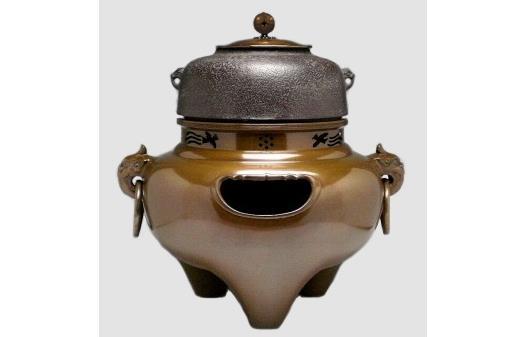
The mouth of such kama is notably higher than the shoulder, and it was this feature that inspired Jōō to propose the rule that such kama, when hung over the ro on a chain, should be suspended so that the mouth projected above the level of the ro-fuchi, since this emphasized its most notable feature.
⁵This might be possible when the host was setting the ro up at dawn (though it would be rather troublesome if the host was going to be using an ordinary ro-gama at his subsequent chakai); but it could only be done at that time.
In other words, it would not be possible to change the ro like this once the initial fire had been laid at dawn.
⁶This was a problem because the small unryū-gama can never be used to start the ro at dawn (because its small size would mean that the water would boil away long before the room was warmed, or the guests arrived). Thus Rikyū codified the rule that the ro should be set up with an ordinary kama. Then, when the host wanted to serve tea using the small unryu-gama, the original kama whould be removed and replaced by the small unryū-gama around the time that the guests were assembling themselves in the koshi-kake. This way, the small unryū-gama would be just below boiling temperature* at the time when the guests entered the tea room for the shoza.
However, if ordinary charcoal was used -- even if several additional pieces were added when the host replaced the kama with the small unryu-gama, the heat of the fire would not reach the bottom of this small kama, hence the need to cut especially long charcoal for such occasions. But long charcoal tends to burn too strongly, meaning that not only can the kama begin to boil over, but the fire will begin to burn out much faster than usual.
It was in this circumstance that Oribe gave voice to his proposal. ___________ *According to Jōō‘s teaching of san-tan san-ro [三炭三露], the fire is laid in the ro at dawn. The host adds more charcoal at noon, and then empties, cleans, and replenishes the charcoal in the ro at dusk. Guests were usually invited to come in mid-morning, or early evening, so when they entered the room, the kama would be sub-boiling (having come to a full boil and then begun to cool down slightly between the time when the charcoal had been arranged and the guests’ entrance for the shoza). Thus, after the fire was rebuilt, the kama would return to a boil in 15 or 20 minutes -- allowing sufficient time for only the simplest of meals.
Placing the small unryū-gama into the ro around the time when the guests are arriving meant that it would also be below boiling when they entered the tea room, so the timing of the meal would be the same as if an ordinary kama were being used.
⁷Oribe argument was that, since the small unryū-gama does not have a shoulder, it is impossible to say whether the rim of the mouth is above or below the shoulder. As a result, there could be no precidential argument made against suspending the kama below the level of the ro-fuchi.
While his explanation was possibly made tongue-in-cheek, it did have the ring of a certain logic to it; and that (together with the fact that it allowed the host to use ordinary charcoal, meaning he would not have to worry about adjusting his timing*) was enough to convince Rikyū of the practicability of this solution.
Because the room was set up with an ordinary ro-gama at dawn, the gotoku would remain in place even after the larger kama was replaced by the small unryū-gama†. Far from being a disquieting note, the legs of the gotoku filled the space between the little kama and the ro-dan, making the ro seem much less empty than would have been the case otherwise‡. ___________ *Rikyū said that the mark of the master was his ability to, after adding charcoal only once (at the beginning of the shoza), complete the service of usucha before the kama fell silent (though ideally with the shō-fū [松風] sound just beginning to weaken while the guests inspected the utensils). Having to use differently sized charcoal would cause disquiet even to a very experienced practitioner, since the burning rate, and heat, would differ markedly (longer pieces of charcoal will catch fire quicker and burn hotter, meaning that the fire will begin to fail much earlier than would have been the case otherwise). We can imagine that Rikyū himself was feeling a certain apprehension about this, hence his immediate and unconditional embrace of Furuta Sōshitsu’s proposal.
†The reason why the small unryū-gama was preferred by Rikyū was because it boiled quickly. That meant that the water would be in contact with the iron of the kama for the shortest time possible before it was used to prepare the tea, meaning that the taste of iron would be kept to an absolute minimum. As a result, the guests could really enjoy the true taste of the tea. in the wabi small room, this was the most important thing, according to Rikyū.
‡This leaving the gotoku in the ro was a special case for the small unryū-gama.
When an ordinary tsuri-gama is going to be used, this larger kama should be suspended in the ro at dawn, and kept there throughout the day. When the kama is a tsuri-gama, the gotoku should not be placed in the ro -- because the chain (or take-jizai [竹自在]) takes the place of the gotoku, so one would be redundant.
The same is true when the projecting flange of a ha-gama [羽釜] rests on top of two little blocks of wood that are rested on the ro-dan: the gotoku should not be placed in the ro on such an occasion because it is unnecessary.
Since the gotoku is not needed (indeed, both the ha-gama and tsuri-gama predated the appearance of the gotoku by several decades), one should not be used. This is different from the case of the small unryū-gama -- and the two should not be confused with each other (as certain modern schools do). The argument that those schools make -- that the gotoku is placed under a tsuri-gama “for safety’s sake” -- is nonsense.
==============================================
◎ If these translations are valuable to you, please consider donating to support this work. Donations from the readers are the only source of income for the translator.
To contribute, please use the following link:
https://PayPal.Me/chanoyutowa
4 notes
·
View notes
Text
The Best Games I Played in 2024
So, its been a crazy ass year huh? Great year to say "fuck this, I want to find a good video game and basically hide in it until the real world is less fucked up than the one with monsters and wizards and shit."
Well, as the year draws to a close and with that thought fresh in our minds now, here's my favorite ten games of 2024. A few ground rules.
This is in NO particular order of best to worst, this is just the ones that stood out in my memories this year.
This is for games I personally played in 2024. Some came out before 2024, but I didn't play them until now so it counts.
These are for the games I liked. Some will be Triple-A, some will be Indies, some will be full release, some will be Early Access.
There MAY be spoilers for some games. If this is an issue, exits over there thank you for stopping by.
Ready, here we go then.

Final Fantasy XVI
Having literally just finished this game at time of writing, I can say that it may well be one of my favorite entries to the series now and I cannot for the life of me work out why the fuck this game was so divisive among the fanbase.
I will say this is the darkest Final Fantasy has been story wise since the infamous Type 0 which literally opens like Anime Apocalypse Now, but it also has plenty of moments of levity to balance out the darker spots.
Its not Turn Based Combat, but it is combat directed by Ryota Suzuki, whose name you may recognize if you're familiar with a certain red-coated white haired swordsman with a fondness for pizza. Thats right, same guy who did Devil May Cry V's combat. If you enjoyed beating the everloving hell out of everything as Dante, you might want to consider this one.
But yes, I genuinely consider this one of my favorite entries out of the FF series now. I mean, it literally ends with you punching God in the face.
I'm not kidding, I screenshotted it.

Personally, I really had fun with it and I'm interested to see what the Seventeenth installment will bring... in about 4-5 years give or take.
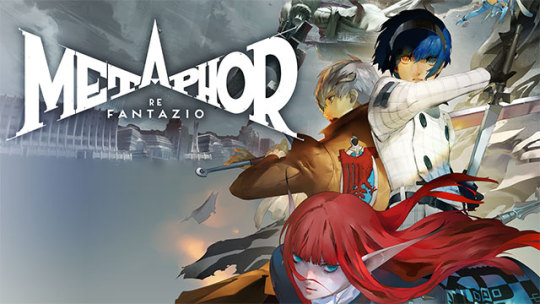
Metaphor ReFantazio
Good year for RPGs from our friends across the Pacific wasn't it? Metaphor is a story about a young man named Will (or whatever name you gave him) who travels the world on a quest to become elected king because of a giant floating face in the sky telling everyone thats how it works now, while beating up monsters based on the works of Dutch painter Hieronymus Bosch that, as it turns out, are the mad remnants of humanity following a war that ended the old world.
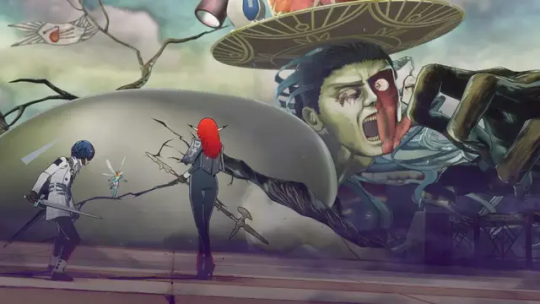
Yeah its a weird game... and basically Persona. But still a decent one.
Only complaint I had was that they didn't stick the landing and the final dungeon was such an ordeal I just said 'screw this noise' and went off to do something else. Sorry Will, looks like your country is screwed. Good luck with that.

Resident Evil Village
Yeah, I know. I just now got to Lady Dimitrescu and her big Mommy Milkers. Theres a lot of games out there and only so many hours in the day okay?
Still I'm glad I got there eventually. While I played through VII as well I found the villains from that one ultimately forgettable and the game itself... not bad but I'd played better.
Village however was absolutely the shot in the arm the series needed. The perfect mix of disturbing horror with the monster baby, the puppet creatures, and the like, and the campy batshittery with bombastic villains like Karl "Hillbilly Magneto" Heisenberg who is now a personal favorite of mine.

Outstanding job on this one Capcom, please don't fuck up RE IX okies?

Enshrouded
If you know me you know I'm a sucker for a good survival crafting game. Mix in RPG elements and set it infront of me and five weeks later the police call off the search and give me up for dead.
Enshrouded is a great title, still in early access mind but with a ton of wonderful ideas behind it and I'm very eager to see where the devs are going with all this.

A high fantasy game where you can focus on being a big burly warrior, a cunning rogue with daggers and bow, a mighty sorcerer, or a little of each as you try to rebuild the world and create your own happy little village to survive the apocalypse... with an actual village infact. Normally I don't like survival games with NPC supporters (I find they get in the way as often as not) but somehow Enshrouded did it right. Good job guys.
SPEAKING OF SUCH GAMES...
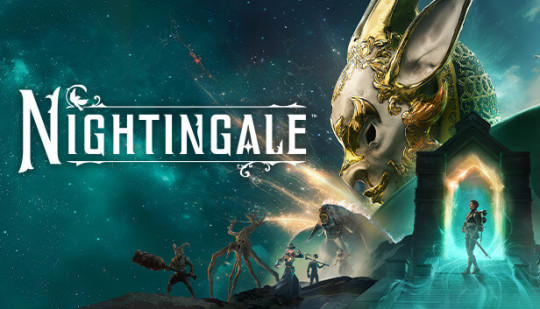
Nightingale
If Enshroued fits me gameplay wise, this is a game that fits me perfectly in terms of genre and theme, and potentially gameplay eventually.
I am a massive massive massive geek for anything fae-themed. Changeling the Lost/Dreaming? Hell yes. Seanen McGuire's October Daye series? Gimme. Pan's Labyrinth? Wunderbar!
I love survival crafting games as I mentioned above.
And anything with a unique clothing aesthetic has my attention immediately. MMOs get me with this all the time with WoW's transmog and FFXIV's glamour system.
So a game that's dripping with fae lore, a survival crafting title, and set in the Victorian era?

(art by @xhyperwolfx )
Yep, if I'm abandoned by the authorities for Enshrouded, then for Nightingale I'll be off with the faeries and won't reappear for a century like Rip Van Winkle.
Its not perfect yet, but the dev team is doing their damndest and after the last major update I'm very interested to see whats coming next.

Aces & Adventures
This one I had almost forgotten about, but just seeing it in my Steam list again makes me want to play it.
A card game RPG where you take a deck of 52 poker cards and, indeed, go on adventures using them. Pick one of five classes and sally forth to see the world with a lovely narration and a story that appears to be looping on itself with each retelling.

I'm best with the mage myself, but I'm kind of wanting to try other ones too. I can definitely say it's a favorite of mine now and one I recommend for gamers on a budget.

Palworld
And as far as I'm concerned Nintendo is just being a little bitch because PocketPair did so many things fans have been asking them to do for years that they had to pull out a bullshit lawsuit.
Palworld is an explorative game with survival crafting elements and collection RPG elements (yes collection RPGs like Shin Megami Tensei, Digimon Story, and ALL THE OTHER ONES THAT NINTENDO IS CONVENIENTLY IGNORING DO THE SAME THING POKEMON DO YES I'M SALTY) where you wash up on a beach, find a tablet, and then say 'eh, may as well catch 'em all.'
Then team up with them all, have them all help you build a base, have them all let you ride them around the world, have them all even pick up a gun themselves and watch a magical squirrel bust a cap in someone's ass.

Still in early access as well, but I have high hopes that they'll weather the storm of Nintendo's little 'waaaaah we wanna be king shit' tantrum and come out the other side better than before.

Pathfinder: Wrath of the Righteous
I didn't really get into this one until 2024 and bigods I'm sorry to Owlcat for taking so damn long. An outstanding CRPG with a downright dizzying number of possible character builds with around two dozen classes and a dozen archetypes for each, a story based on the Pathfinder Adventure Module of the same name, and a well imagined Mythic Path system where you can literally play god by the end of the game.
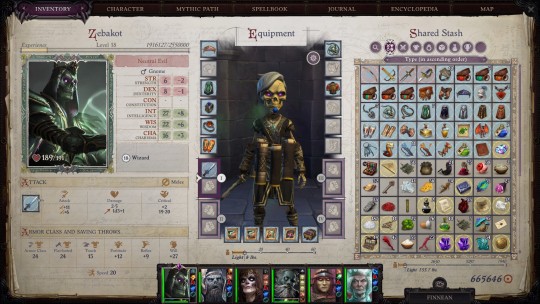
Want to be an undead gnome? Well oogity boogity m'lads!
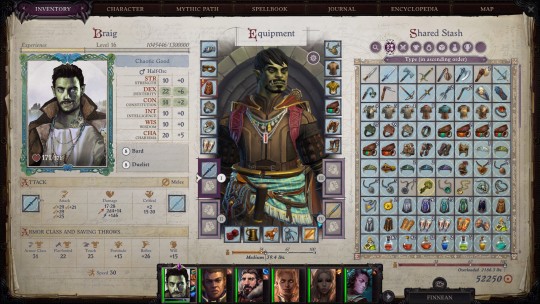
A half orc bard who is becoming a fae lord? Why the hell not!
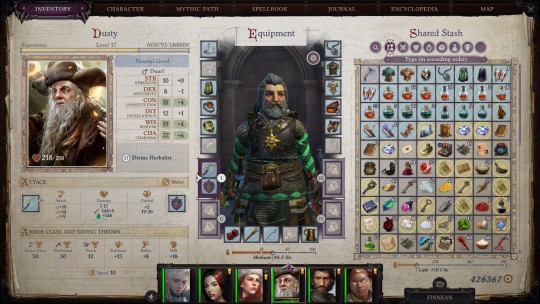
A dwarven herbalist who rides around on a wolf because of his crippled back and makes healing salves out of magic plants? Godspeed ya mad bastard!
I kept starting over because I kept getting new ideas for new characters to be and come up with stories for and if you've ever glanced at my writing projects like Adventures in Azeroth...
... read my godsdamn fanfic... o_o
Anyways, point is, if something grabs my story brain that thing is basically going to live rent free in my head for the rest of my life.
Their follow up to this, Warhammer 40k Rogue Trader, wasn't bad at all... but Pathfinder was a lot more fun and I do hope Owlcat return to the world of Golaria someday.

SandLand
Out of all of Toryama's properties (miss ya big guy) I would never have thought SandLand would have gotten more than maybe a tiny mobile game tie in.
Instead it got a huge explorative action RPG with some great voice acting (though they could stand the option to tone down the tank chatter,) a bright colorful world, and an interesting story that actually continues on AFTER the end of the short-lived comic series he did for Shonen Jump back in the day.

A surprise I had not expected, but a title I grew to love. I never got around to finishing it and I feel like I should really do something about that someday soon.

Pacific Drive
Easily the most unique and surreal game I've played in the past several years. You wind up in a bizarre exclusion zone where reality has gone all wibbly wobbly on you, bound to an apparently sentient station wagon, and now you have to customize and prepare it to drive across the ruined wastelands in the hopes that you can escape back to civilization.

And... thats it. Drive around and explore, avoid reality warping insanity, and keep your car in one piece as it is your only means of protection and conveyance.
Sounds simple, but its anything but. Hazards will do tons of hurt to your little four door (and indeed may reduce the number of doors entire,) you have to constantly scavenge for bits to repair the car, build tools, and new gear, and there's areas where if you stay out too long you run the risk of a rather unfortunate fate... though whether thats death via radiation sickness or being transformed into a rubber duck is a detail the game never goes into.
An outstandingly imaginative title that I recommend to anyone who loves exploration, or just always wanted to customize a car.
And thats my 2024 in review. Thank you for joining me, and here's hoping I get to do a 2025 in review before the downfall of western civilization due to a combination of climate change disasters, social unrest, and having re-elected an orange clown to the White House.
Happy new year everyone!
3 notes
·
View notes
Text



















Minimal / Baroque Gianluca Pacchioni Art and Design
photos by Lorenzo Pennati, edited by Federica Sala, texts by Olivier Gabet, Alberto Cavalli, Federica Sala, Clio Lavau, Gianluca Pacchioni
Rizzoli, New York 2021, 319 pages, 28,6x37,5cm, ISBN 978-8891832108
euro 85,00
email if you want to buy [email protected]
An intimate and complete journey into the world of Gianluca Pacchioni, sculptor, designer, and master in arts and crafts.
This book is an exploration of the artistic world of Gianluca Pacchioni, from the backstage of his workshop in Milan to his incredible studio-house, as well as finished projects and open-air installations. It also touches on his inspiration, which is drawn from a mix of Italian classicism and Japanese minimalism, with a dash of French seventeenth-century decorative style. First based in Paris, where Pacchioni became a sculptor in the 1990s, and then in Milan, his hometown, his atelier constantly forges sculptures and limited-edition furniture produced for international clients. As a pioneer in the art and design world, his approach to art is experimental and innovative, and over the years he has shifted from iron to stainless steel, and his most recent works have been made with cast bronze and semiprecious stones and marble.
La storia "per oggetti d'arte" di Gianluca Pacchioni, artista, scultore e designer, dalla scoperta dell'amore per il ferro e della sua vocazione di artista, a Parigi negli anni '90, allo studio/laboratorio in una vecchia fabbrica di Milano, dove produce opere d'arte in metallo e pietre, edizioni limitate di oggetti di design destinate alle abitazioni, gallerie e collezioni di tutto il mondo. La sua ispirazione nasce dalle linee pulite del classicismo italiano e dal minimalismo giapponese, con un approccio sperimentale e innovativo che esplora nuovi materiali, dal ferro, all'acciaio al bronzo, al marmo e alle pietre semi-preziose. Arrivato all'arte dopo gli studi in Economia alla Bocconi è uno degli esponenti dell'Art Design e ha esposto alla grande mostra Homo Faber, a Venezia presso la Fondazione Giorgio Cini, durante la Biennale del 2018. Questo volume è il risultato di una collaborazione decennale con il fotografo Lorenzo Pennati e racconta il percorso della sua arte con oggetti di interiors (come la libreria Collapse e i paraventi in bronzo), opere d'arte e installazioni site specific. Il libro è in lingua inglese.
11/11/24
#Minimal/Baroque#Gianluca Pacchioni#artista scultore designer#amore per il ferro#opere in metallo e pietre#foto Lorenzo Pennati#art books#designbooksmilano#fashionbboksmilano
5 notes
·
View notes
Text
"even a story written by someone like me."
the second instalment of my musical translation series — travelling back to the joseon era for a feminist tale of empowerment, dignity, and writing one's own past, present, and future.
the video is not mine, but all translations are my own.

musical: here, pihwadang (여기, 피화당)
cast: [gaeunbi] jeong inji, choi soojin, kim eehoo • [maehwa] jang boram, jeong daye • [gyehwa] baek yeeun, kwak nayoon • [huryang] cho poongrae, cho hun • [puppy] ryu chanyeol, lee chanryeol
synopsis: in the postwar landscape of late seventeenth-century joseon, the women who had been dragged away and violated by the invading qing army finally return home — to a country that shames them and families that scorn them. fleeing from the in-laws who plan to kill her to preserve their reputation, the noblewoman gaeunbi — together with her handmaiden gyehwa and the crossdressing swordswoman maehwa — seeks solace in a cave deep within the mountains. brought together by their shared trauma, the three women label their new abode "pihwadang," a place of refuge from misfortune. under the cloak of anonymity, gaeunbi writes stories that gain widespread popularity amongst the public. meanwhile, huryang writes to clear his father's name and criticise the country for its treatment of the women who returned from qing, but barely anyone pays him any attention. resolving to commission the renowned anonymous author so that his story can reach a wider audience, huryang sets off in search of the elusive writer with his loyal servant, gathering clues from gaeunbi's tale...
production: hong company (twitter / youtube)
[ this musical will be streaming online here! kim eehoo my love ]
- ☽ -
youtube
- ☽ -
나 같은 사람이 쓴 이야기도 — even a story written by someone like me
kim eehoo as gaeunbi
I’m not sure Am I truly someone capable of such? The words I write Can they truly have such power?
All I did was live on, flickering faintly Like a candle burning out In a dark cave
Even a story written by someone like me Can it remain in this world? Even a story written by someone like me Can it be of comfort to someone?
I worry that If, by any chance Someone may be hurt by The words I write
I fear that The truth behind Pihwadang may come to light While writing the story of that winter
Even a story written by someone like me Can it remain in this world? Even a story written by someone like me Can it be of comfort to someone?
Still, I wish To let our stories be heard Still, I wish To let our voices be heard
Although it’s so painful I wish to avoid it And erase those memories
Even a story written by someone like me If it can remain in this world Even a story written by someone like me If it can be of comfort to someone
If it can be so
[ original korean lyrics here. ]
3 notes
·
View notes
Photo








María Inés Calderón (1611 – 1646 )
“A woman who apparently was not beautiful, but she had a lot of grace and charm. In addition to reciting, singing and dancing very well.”- Elvira Menéndez
María Inés Calderón, known as La Calderona and Marizápalos, was the most important actress in the Spain of the seventeenth century, who became the mistress of King Felipe IV and mother of his illegitimate son, Juan José of Austria. La Calderona was involved in a relationship with Ramiro Pérez de Guzmán, Duke of Medina de las Torres, at the time Felipe IV first saw and got smitten by the actress-singer on her debut at the Corral de la Cruz theatre in Madrid in 1627. But when the king got in the way, the lover had no choice but bow his head. La Calderona became the favorite of Felipe IV.
Enamoured of the red-headed actress, Felipe IV installed his lover in a balcony overlooking the square, a decision that flew right in the face of convention as these seats were meant to be the exclusive preserve of the aristocracy. After spotting her rival sitting in the posh seats, the queen Isabel de Borbón flew into a rage and threw La Calderona out of her love nest in the palace. To compensate, the rather sneaky king, then ordered that a secret balcony to be built under an arch. In this way, his lover could attend events at the Plaza Mayor and remain out of sight.

Upon the birth of her son in 1629, La Calderona lost the custody of him despite her protests. Her relationship to the king ended the same year. There were rumors at the time that her son was fathered by Ramiro Pérez de Guzmán. La Calderona was forced to become a nun against her will. Felipe IV ordered her entry into the monastery of San Juan Bautista of Valfermoso de las Monjas, in Alcarria, where the interpreter would lose contact with life, the theater, her son. In 1642, the King recognized Juan José officially as his son, and Juan José began his life's career as a military representative of his father's interests.
It was said that she died in closing, already under the name of Mrs. Maria de San Gabriel, Abbess. But it has also been written that she fled: that she managed, on the one hand, to escape from God's mandate and escape, along with a bandit, to the Sierra de la Calderona (Valencia) and, in another version, that she returned to Madrid, where she would welcome the guild of actors: « A kind of union that gave relief to interpreters who were in poor condition or who were already older. There seems to be data that helped her. Which would mean that she did not die in the convent as they officially said ».
The few concrete data of María Inés Calderón have served to increase the legend. Also regarding her family. It is not uncommon to find references to Pedro Calderón de la Barca as father of the creature. But far from it. It seems that, being very small, appeared at the door of Juan Calderón, a lender of the theater world and father of Juana, also an actress, although not as renowned as «La Calderona».
(x)(x)
#Maria Inés Calderón#La Calderona#Felipe IV#Philip IV#Juan José de Austria#Juan José of Austria#women in history#Spanish history#Carmen Maura#Paisaje con figuras#documentary
24 notes
·
View notes
Text

HOME TO ROOST, the final installment of the Devil & the Deep Blue Sea trilogy, is now live! Click above to read the seventeenth chapter!
One fateful night nearly one year prior, Kingsley Tealeaf escaped captivity in the Hespet Archipelago and vowed to leave the world he left in his wake changed. Having made his name known as one to be feared, Captain Tealeaf has taken his faithful crew northward and turned his sights towards Darktow. ‘Scores to settle’ does not even begin to cover it. This is war — and all that it entails. As Kingsley reaches the end of the labyrinth and as more players show their hands and faces, the only thing that is certain is that nothing is guaranteed.
It’s Kingsley’s turn to take up the Nein’s mantle of being a hero that no one has heard of. The Revelry’s throne is his for the taking — provided that someone else doesn’t get there first.
A/N: As I mentioned earlier, from hereon out we're switching to a biweekly update schedule, since these final chapters are trending longer and I need more time to edit/plot. As it was for the last book, expect updates around the 15th and the 30th of every month.
Chapter XVII: People stick their noses where they're not supposed to, and we have not only a new ally but an impromptu wedding. Kingsley has more excellent ideas. It's the calm before the storm -- who will weather it, and who will sink?
4 notes
·
View notes
Text

Avec le café de Flore, Les Deux Magots est un des deux grands cafés littéraires de Saint-Germain des Prés. Il revendique même le titre de « café littéraire » sur sa banne. Un prix littéraire y est au reste décerné en janvier de chaque année depuis 1933. Comme pour la closerie des Lilas, on trouve dans son nom un terme rare aujourd’hui incompris : « magots ». Un magot est un lointain dérivé de Magog, personnage biblique.
Désignant à partir du XVIe siècle un homme très laid, ce terme entre au XVIIe dans le vocabulaire des arts décoratifs pour nommer les porcelaines représentant des personnages grotesques, par imitation de celles provenant d’Extrême-Orient. Or, le café actuel s’est installé en 1885 à la place d’un magasin du nouveauté (1813), qui avait choisi le nom Les Deux Magots de la Chine pour évoquer le luxe de l’Orient. Il reste de ce passé deux « magots », habillés à la chinoise, accrochés à un angle.
On aperçoit Les Deux Magots café dans Les Aventures de Rabbi Jacob (1973). C’est un café si touristique qu’il faut souvent patienter dehors dans une file d’attente. Il attire aussi une clientèle fortunée, étrangère notamment.
En savoir plus sur : https://www.laculturegenerale.com/cafes-celebres-paris-meilleurs-liste/ ©
***********
Along with the Café de Flore, Les Deux Magots is one of the two great literary cafés in Saint-Germain des Prés. He even claims the title of "literary café" on his banne. A literary prize has been awarded in January of each year since 1933. As for the closerie des Lilas, we find in its name a rare term today misunderstood: "magots". A hoard is a distant derivative of Magog, a biblical character.
Designating from the sixteenth century a very ugly man, this term enters the seventeenth in the vocabulary of decorative arts to name porcelain representing grotesque characters, in imitation of those from the Far East. However, the current café was installed in 1885 in place of a novelty store (1813), which had chosen the name Les Deux Magots de la Chine to evoke the luxury of the Orient. There remain from this past two "magots", dressed in Chinese style, hanging at an angle.
Les Deux Magots café can be seen in The Adventures of Rabbi Jacob (1973). It's such a touristy café that you often have to wait outside in a queue. It also attracts wealthy clients, especially foreigners.
Learn more about: https://www.laculturegenerale.com/cafes-celebres-paris-meilleurs-liste/ ©
3 notes
·
View notes
Video
LIVORNO DIASPORA teaser from Martino Chiti on Vimeo.
"Until every shape has found its city, new cities will continue to be born. When the forms exhaust their variety and come apart, the end of cities begins." from "The invisible cities", Italo Calvino
Cities are always multiple, they can hide on themselves by taking on distinct forms, evident as to the eye or mental, hidden between thoughts and the exchanges that are consumed there. Sometimes invisible like folds on the same surface. This is one of these cities between cities: Livorno. These are some of its potential invisible folds.
Livorno Diaspora is an ongoing transmedia project which represents the foreign communities of Livorno. A city of welcome born in the seventeenth century from the thrust of Medici’s Livornine laws, it was one of the first cosmopolitan cities in the world where anyone would be allowed - by law - no matter their origins, culture or religion.
The project analyze the city through images and sounds. Not only with photos but through an audio visual immersive installation. The viewer is contained in a flow in which he finds himself part. A set of fragmented memories in which we immerge and, transported by the emotional tension of sounds and images, we are stimulated to the perception. Personal memory becomes universal.
A phantasmagoria of images and sounds shaped by the places, the colors, the food, the music, the traditions brought by the diaspora. Recognize, in the different cultures, a new form in which the territory is enriched with unknown lives and the unknown lives takes possession of a new territory without losing contact with the land of origin.
Today Livorno reveals itself in a new return to its origins with a population composed by a mix of different nationalities which add new components to the local culture, in a process of integration/dis-integration that makes the city an example of functional diversity.
4 notes
·
View notes